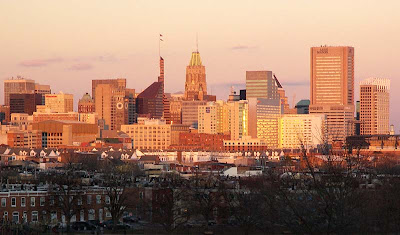Maybe you know of Baltimore as the resting place of Edgar Allen Poe or the birthplace of the National Anthem. Maybe you know of it as a hotbed of civil rights conflict from the musical Hairspray, or as the home of its writer and director, John Waters. Maybe you're a part of the kidlit community and you read about Baltimore in Nat Standiford's fabulous How to Say Goodbye in Robot. Or you might associate it with the violent drug trade depicted in the show The Wire. You might know it for its once-thriving port community, or for how that's expressed now in the city's reputation for delicious Maryland crab cakes (the best ones, by the way, can be had at G&M). Or maybe you'd recognize Baltimore for its quirky side, from the hons of Hampden to the lawn flamingos that litter our yards, porches and roofs.
Or maybe, like much of the world, you don't know much of anything about Baltimore at all.
For a city that's so often overlooked, Baltimore inspires surprising loyalty in those who call it home. It harbors a thriving community of artists, writers, do-it-yourself-ers, and students lured by the absurdly low cost of living and hooked on the city's unique atmosphere. These are just a few of my favorite things about the city:
People & Ideas
- The Effervescent Collective is a young organization dedicated to bringing contemporary dance to Baltimore's inhabitants in an accessible, experiential way. The collective strives to bring dancers and non-dancers together to generate "sacred, high-energy movement and shared ideas." In their interactive performances, workshops and online community, the collective creates an ongoing creative dialogue in Baltimore through dance. (P.S. You can read about the collective's extraordinary founder, Lily Susskind, here.)
- In its first year, Glass Mind Theatre was voted Baltimore's best new theater in Best of Baltimore 2010. Run by a group of Baltimore's best and brightest recent grads (including my awesome roommate—hi Sarah!), the company based its first performance on the ideas tweeted, Facebooked and emailed to the group's founders. In March, they'll perform Neighborhood 3, a critically acclaimed show about suburbia, gaming, and zombies.
- I don't harbor any delusions about my musical expertise; I'm about as knowledgeable as a brick when it comes to the names of band members or the newest trends in music. But 89.7 WTMD, Baltimore's listener-supported radio station, reminds me how much I love the stuff. And between Unsigned Baltimore and Detour: the Folk Roots & World Music Hour, their shows keep me up-to-date on the music scene in Baltimore and around the world.
- The Urbanite is, in my opinion, one of the best magazines of its kind, nation-wide. The free magazine features outstanding writing on thoughtful topics like innovation, family, and sustainability. The always well-designed publication also makes room for local artists and writers to share their stories. I can't help but devour the new issue each month, and I'd kill to have a conversation with those writers and editors.
- Speaking of some of the best writers in Baltimore, Kevin Griffen Moreno made it onto my radar this past year with his blog, Unsung Baltimore. Kevin is not only a talented writer and photographer, but also a devoted advocate of the people of Baltimore City; in addition to serving the city through his position at the Baltimore Community Foundation, Kevin gives credit to the extraordinary talents and ideas of Baltimoreans in his fabulous blog posts.
- Evening Red Press is one of Baltimore's newest literary arts magazines, off to a strong start with three online editions, all showcasing some of Baltimore's finest multimedia art and writing.
- In contrast, Smartish Pace is one of Baltimore's oldest literary magazines. I have a special attachment to the magazine since I began my literary career as an intern for the magazine in 2006, and I've discovered some of my favorite poets, from Lynnell Edwards to Maurice Manning, in its pages.
- When I was very young, my parents used to bring me into the city for shows and soccer games, and I would stare at the glowing top of the Bromo Seltzer Tower with wonder. Raised on The Lord of the Rings, my seven-year-old self was convinced that the blue light at the top of the tower was a spell cast by the wizard who I was sure lived there. Though it might not be home to a wizard, The Bromo Seltzer Arts Tower does house dozens of Baltimore artists in its studio space.
- Bad Decisions has made a name for itself in Baltimore and on the Food Network for its Bacon and Beer Happy Hour, but many of the city's inhabitants knew and loved the bar long before the first B&BHH. Don't be deterred by the bar's divey appearance; itsowner, John Reusing, is one of the city's most creative and skilled bartenders. His original drink recipes, scrawled in a drink-wrinkled marble notebook, stand testament to that fact—where else can you get a Pickletini, a Bloody Mary with crab juice in it, or (one of my favorites) a Pan-Galactic Gargle Blaster?
- The first of its kind, The American Visionary Arts Museum calls Baltimore home and showcases the work of self-trained artists, from PostSecret's Frank Warren to"The Simpsons" creator Matt Groening. More an adventure than a museum, the AVAM celebrates creativity in the odd and overlooked, the secret work of those compelled to create, and the crafts and tools of people who haven't had the option of arts training. The museum's supporters also celebrate the quirkiness of their mission each year with Baltimore's Kinetic Sculpture Race, an event you have to see to believe.













